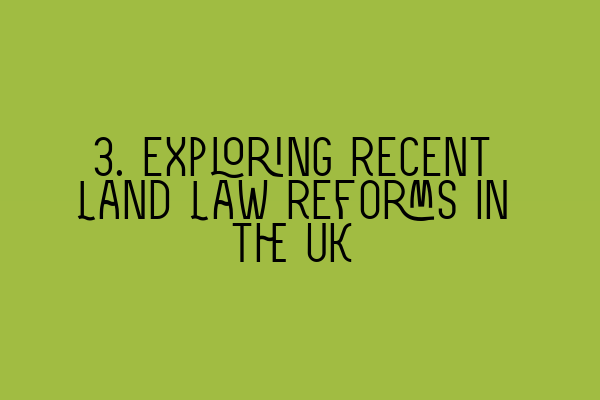3. Exploring Recent Land Law Reforms in the UK
As a leading solicitor firm specializing in property and land law, SQE Property Law & Land Law is dedicated to keeping you informed about the latest developments in this ever-changing legal landscape. In this blog post, we will delve into three recent land law reforms in the UK that have significant implications for property owners, buyers, and sellers. So, let’s dive right in!
1. The Land Registration Rules 2020
The Land Registration Rules 2020, which came into force on 6 April 2020, mark a significant step towards modernizing the land registration system in the UK. These reforms aim to make the registration process more efficient and user-friendly, simplifying the requirements for registering land and property.
Key changes introduced by the Land Registration Rules 2020 include the introduction of new electronic forms and digital signatures, enabling faster processing times and reducing paperwork. These reforms also strengthen the safeguards against fraudulent registrations, enhancing the security of property ownership.
To ensure compliance with the Land Registration Rules 2020 and navigate through the intricacies of land registration, it’s crucial to seek the guidance of experienced property law solicitors like SQE Property Law & Land Law.
2. The Leasehold Reform (Ground Rent) Bill
The Leasehold Reform (Ground Rent) Bill, currently making its way through Parliament, intends to address the controversial issue of escalating ground rents in leasehold properties. This bill seeks to restrict ground rents to a nominal amount, effectively abolishing exorbitant charges that some leaseholders face.
By curbing escalating ground rents, the Leasehold Reform (Ground Rent) Bill aims to make leasehold properties more affordable and attractive to potential buyers. It also aims to protect leaseholders from unfair practices by introducing stricter regulations for managing agents and freeholders.
If you are a leaseholder concerned about your ground rent or a potential buyer interested in leasehold properties, it is vital to stay up-to-date with the progress of the Leasehold Reform (Ground Rent) Bill. SQE Property Law & Land Law can provide you with expert advice and guidance on leasehold matters.
3. The Building Safety Bill
The Building Safety Bill is a crucial reform introduced in response to the tragic Grenfell Tower fire of 2017. This bill aims to improve building safety standards and ensure that residents of high-rise buildings are protected from the risk of fire and other hazards.
Under the Building Safety Bill, stringent regulations will be introduced for building owners and managers, including the establishment of a new Building Safety Regulator. This regulator will have powers to oversee the safety of high-rise buildings and enforce compliance with safety standards.
For property developers, owners, and occupiers, the implications of the Building Safety Bill are significant. It is essential to understand the duties and responsibilities imposed by this bill to ensure compliance and mitigate potential risks.
Conclusion
These are just three examples of recent land law reforms in the UK that have far-reaching consequences for property owners and buyers. Stay informed about these reforms and any future developments to make informed decisions regarding your property matters.
At SQE Property Law & Land Law, we are committed to staying ahead of the curve and providing our clients with expert advice and guidance on all aspects of property and land law. If you require assistance navigating through these reforms or any other property legal matters, our experienced team is here to help.
To learn more about our services and how we can assist you, please explore our website or contact us today for a consultation. And don’t forget to check out our related articles:
– SQE 1 Practice Exam Questions
– SQE 1 Practice Mocks FLK1 FLK2
– SQE 2 Preparation Courses
– SQE 1 Preparation Courses
– SRA SQE Exam Dates
Disclaimer: The content of this blog post is for informational purposes only and should not be construed as legal advice. Always consult a qualified solicitor for advice tailored to your specific circumstances.
